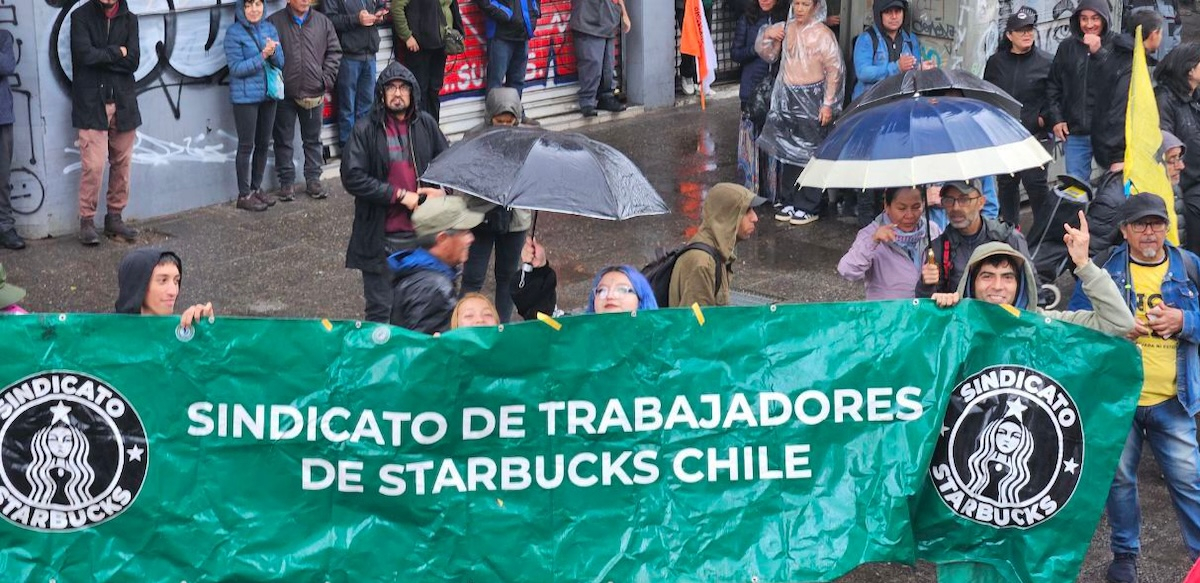Chilean Starbucks Workers Gain Second Contract after Strike

Starbucks workers in Chile struck for 25 days and secured their second contract from Alsea, the company that operates Starbucks in Chile. Photo: Sindicato SBK
After a 25 day strike, on March 31 the baristas of the Sindicato SBK won a second contract with Starbucks Chile (Alsea). Among their wins is paid leave for parents of any gender.
Starbucks opened its first store in Santiago, Chile in 2003. Baristas in Santiago formed their first union in 2009, Sindicato de Starbucks Coffee Chile (Sindicato SBK). They were unable to secure a contract until the U.S. company sold Starbucks in Chile to Alsea. Meanwhile, Starbucks workers in the U.S. are still trying to secure their first contract, after winning union votes in 600 stores.
Vanessa Alvarez recently spoke with Antonio Paez, a 16-year barista in Santiago, and president of the grassroots union. The interview has been translated and edited for length.
Why did baristas in Chile begin organizing?
We started the union because of worries workers had, especially because of the economic crisis in the United States. We noticed that stores were closing [in the U.S] and we didn’t know what could happen here. Those concerns pushed the initial group [in Santiago] to form the union, and in 2010 the first negotiation took place.
When we started negotiating, we could immediately see that they were a very anti-union company. Starbucks at that time was controlled by the corporation in the United States. They stated directly that they were not going to negotiate with unions, that they did not negotiate with unions and that, therefore, no matter how much we asked, how many we were, they did not care at all, they were not going to give in.
It was a rather traumatic experience that caused the union to go from 51 percent representation to less than 10 percent.
When Starbucks locations in Chile were bought out by Alsea Cono Sur, we stopped having any relationship with Starbucks in the U.S, and we began the process of reorganizing the union.
In 2020, during the pandemic, the company decided to take advantage of a law passed by the Chilean government that was originally intended for small businesses. This law meant all workers would immediately stop working at Starbucks and that our salaries would be paid through unemployment insurance, which consists of workers’ savings that workers and is supposed to be for periods of unemployment.
But Starbucks used it so that we would have to pay our own salaries. This caused massive indignation among the workers, which led to the vast majority of them joining a union. We went from being approximately 270 in February 2020, to being more or less 1,100 in April of 2020.
What also helped was that our assemblies became quarterly events with an emphasis on everyone being able to give their opinion. That has been very important because it allowed us to legitimize our organization.
There was a time when the company was carrying out a dirty campaign against us. They insisted that we were spending the money from the workers' contributions on sneakers, cell phones, things like that. This is false, and our democratic process was helpful in fighting back.

SUPPORT LABOR NOTES
BECOME A MONTHLY DONOR
Give $10 a month or more and get our "Fight the Boss, Build the Union" T-shirt.
Assemblies also allow baristas to express their concerns about their workplaces. For example, working mothers can organize a fight for proper working accommodations if they are pregnant.
How do you convince your coworkers of the benefits of joining the union?
We focus on talking to workers about their concerns.
For example, with recent sympathies to Palestine, we consider it important to raise flags at stores in solidarity of the Palestinian people, and many workers agree with the union.
We are also deeply tied with the feminist movement. Groups of women in the union have their own space for organization, who are obviously financed by the union. They hold meetings, meetups, and other events.
The union is dedicated to improving working conditions, but it is also a space for workers to engage in community social justice.
What are the union's goals in Chile going forward?
We have several goals, but probably the most important one right now is to be able to negotiate a better collective contract than the one we won in 2022 because the salary scale in Chile is very low compared to other countries. There is also the subject of trans workers’ rights, because here in Chile it is very difficult for trans people to work, and even within Starbucks they suffer various types of discrimination. We also tackle the subject of trying to generate gender equality policies, such as parental rights.
Is there anything you’d like to say to fellow baristas in the United States?
Good luck and never stop fighting. Here in Chile, we are obviously always willing to support you, so count on us for that.
You can follow Sindicato SBK on Instagram The full interview is here on the website of the Harry Bridges Center for Labor Studies, University of Washington.
Vanessa Alvarez is a Seattle labor activist.



